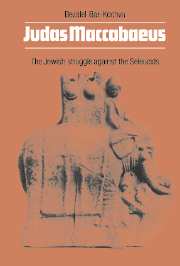Book contents
- Frontmatter
- Contents
- List of illustrations
- Transliteration of Hebrew
- Acknowledgements
- Prologue
- PART I HISTORICAL EVALUATION
- 1 Introduction: Deployment and tactics in field battles during the Hellenistic period
- 2 The number of combatants on each side
- 3 The armament and tactical composition of the Jewish army
- 4 The ethnic origin and fighting capability of the Seleucid phalanx
- 5 The Seleucid army and mountain warfare
- 6 The military achievements of the Jewish forces
- 7 The battlefields, tactics and leadership of Judas Maccabaeus
- PART II ACCOUNTS OF THE BATTLES: INTRODUCTION, TEXT AND COMMENTARY
- PART III APPENDICES
- EXCURSUS
- Plates
- Abbreviations
- References
- Indexe locorum
- General index
- Index of Greek terms
- Index of Hebrew words and phrases
6 - The military achievements of the Jewish forces
Published online by Cambridge University Press: 04 August 2010
- Frontmatter
- Contents
- List of illustrations
- Transliteration of Hebrew
- Acknowledgements
- Prologue
- PART I HISTORICAL EVALUATION
- 1 Introduction: Deployment and tactics in field battles during the Hellenistic period
- 2 The number of combatants on each side
- 3 The armament and tactical composition of the Jewish army
- 4 The ethnic origin and fighting capability of the Seleucid phalanx
- 5 The Seleucid army and mountain warfare
- 6 The military achievements of the Jewish forces
- 7 The battlefields, tactics and leadership of Judas Maccabaeus
- PART II ACCOUNTS OF THE BATTLES: INTRODUCTION, TEXT AND COMMENTARY
- PART III APPENDICES
- EXCURSUS
- Plates
- Abbreviations
- References
- Indexe locorum
- General index
- Index of Greek terms
- Index of Hebrew words and phrases
Summary
As we have seen, the Jewish army more than once outnumbered the enemy and its equipment was by no means primitive. On the other hand, the Seleucid army was fit, experienced and rather familiar with mountain warfare, so that the standard of manpower and the battle site would not necessarily have constituted an advantage for the Jews. We should consequently re-examine the conventional admiration for the dimensions of the Jewish military achievement. Is that admiration justified? In order to reply to that question we must clarify whether and when the Jews fought against forces that properly represent, at least formally, the royal Seleucid army in number and quality and what the balance sheet of achievement against them was. It appears that of the various clashes of Judas Maccabaeus with the regular Seleucid forces, it was at Ammaus, Beth Zacharia and Elasa alone that his force was required to face royal armies. In two of these battles he failed, and only at Ammaus did he gain a glorious victory.
The scope of the first two battles, against Apollonius and Seron, was quite modest in scale and importance. Apollonius was apparently then the governor (meridarkhēs) of Samaria and fought the rebels either because their main base was in the toparchy of Aphairema- Gophna, then part of his meridarchy (I Macc. 11.32) or because the troops that were stationed in Judaea and Jerusalem were incapable of taking effective action. The force that set out with him was composed of‘gentiles and those from Samaria’ (I Macc. 3.10).
- Type
- Chapter
- Information
- Judas MaccabaeusThe Jewish Struggle Against the Seleucids, pp. 130 - 137Publisher: Cambridge University PressPrint publication year: 1989



